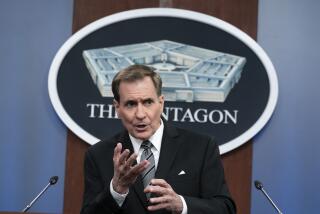Study Credits Air Power in Gulf Victory : Military: Analysts caution that the situation in Iraq was unique. They warn that bombing raids would not be nearly as effective in Bosnia.
- Share via
WASHINGTON — A new Pentagon-sponsored study of the 1991 Persian Gulf War has largely credited air power with the allied victory, but analysts caution that the situation in Iraq was unique and warn that air power would not be nearly as effective in Bosnia-Herzegovina.
The study, conducted by a team of independent military scholars, concluded that with a few exceptions, U.S. and allied warplanes exceeded expectations, demolishing Iraqi equipment and forces and paving the way for a relatively easy victory by U.S. ground troops.
But private analysts warn that the conditions that prevailed in the Gulf War--weeks of preparation, for instance, and miles of open desert to operate in--were unusually favorable, and far different from those that President Clinton faces in considering U.S. military action in Bosnia.
Robert W. Gaskin, a former Pentagon air strategist who helped plan air operations during the Gulf War, said Clinton would be bound to be disappointed if he were to rely solely on air power to blunt Bosnian Serb artillery.
“If you can’t hunt down Scuds (Iraqi missiles) in the desert (successfully), how are you going to hunt down Serbian artillery in Bosnia?” asked Gaskin, who now is a vice president of Business Executives for National Security, a defense-oriented research group.
William M. Arkin, director of military research for Greenpeace, and an acknowledged air-power expert who has just returned from a firsthand look at U.S. bomb damage in Iraq, agreed with Gaskin’s assessment.
Because of its success in the Gulf War, air power “has become the weapon of choice” for political leaders in trying to deal with regional conflicts, Arkin said, but it is not always fully effective.
Arkin cautioned that “the unique conditions of the Gulf War--the preparatory work, the desert, the absence of political restrictions--may never be re-created,” and he warned that assuming that Bosnia would turn out the same would be “a mistake.”
The Pentagon-sponsored study, commissioned by the Air Force in 1991, had been scheduled to be made public in April, but insiders said it was delayed to avoid seeming to hamper Clinton’s military options as he was beginning to weigh air strikes in Bosnia.
Clinton confirmed Tuesday that, partly because of allied opposition to launching air strikes, he is considering sending troops to Macedonia as part of a U.N. peacekeeping force in an effort to prevent the fighting in Bosnia from spreading. But officials said Wednesday no decision was imminent.
The survey, consisting of 10 top-secret reports and an unclassified summary, called allied air power during the Gulf War overwhelming. It credits air power with destroying a large part of the Iraqi army, demoralizing the rest and rendering the force incapable of large-scale operations.
At the same time, however, it pointed out that allied warplanes proved unable to destroy Iraq’s chemical, biological and nuclear weapons programs, which were a major reason for U.S. entry into the conflict, or to hit any of the mobile Scud missiles that Iraq fielded.
It also noted that achieving air dominance in the Gulf required the deployment of an extremely large proportion of total U.S. air power.
“A simultaneous contingency elsewhere would have forced us to wage Desert Storm very differently,” an accompanying document said.
And it said U.S. bomb-damage assessment procedures were seriously flawed, to the point where war planners ultimately lost confidence in intelligence-gathering efforts in the field.
The report showed that the United States and its allies deployed about 1,760 combat planes and 747 support aircraft in the Gulf War, flying almost 53,000 bombing sorties and making an estimated 41,300 strikes. (Some of the planes never actually got to their targets.)
The document estimated that by the time the allies launched the ground offensive against the Iraqis, air power had destroyed or disabled over 50% of the tanks and armor in Baghdad’s front-line divisions and almost one-fourth of the elite Republican Guard’s armor.
More to Read
Sign up for Essential California
The most important California stories and recommendations in your inbox every morning.
You may occasionally receive promotional content from the Los Angeles Times.










